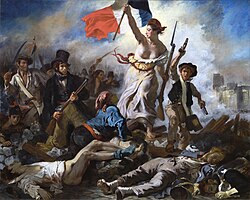
Back ثورة يوريكا Arabic Rebel·lió de l'Eureka Catalan Eureka Stockade German Eureka Ribelo Esperanto Eureka Stockade Spanish Eurekan kapina Finnish Révolte d'Eureka French Éirí Amach Eureka Irish Pemberontakan Eureka Malay Eureka-opprøret NB
 Eureka Stockade Riot by John Black Henderson, 1854 | |
| Date | 1851–1854 |
|---|---|
| Location | Colony of Victoria |
| Participants | Gold miners and the Victorian colonial government |
| Outcome |
|
| This article is part of a series on the |
| Eureka Rebellion |
|---|
 |
|
|
| This article is part of a series on the |
| History of Australia |
|---|
|
|
| Part of a series on |
| Political revolution |
|---|
 |
|
|
The Eureka Rebellion was a series of events involving gold miners who revolted against the British administration of the colony of Victoria, Australia during the Victorian gold rush.[1] It culminated in the Battle of the Eureka Stockade, which took place on 3 December 1854 at Ballarat between the rebels and the colonial forces of Australia. The fighting resulted in an official total of 27 deaths and many injuries, the majority of casualties being rebels. There was a preceding period beginning in 1851 of peaceful demonstrations and civil disobedience on the Victorian goldfields. The miners had various grievances, chiefly the cost of mining permits and the officious way the system was enforced.[2][3]
Tensions began in 1851, with the introduction of a tax on gold mines. Miners began to organize and protest the taxes; miners stopped paying the taxes en masse. The October 1854 murder of a gold miner, and the burning of a local hotel (which miners blamed on the government), ended the previously peaceful nature of the miner's dispute. Open rebellion broke out on 29 November 1854, as a crowd of some 10,000 swore allegiance to the Eureka Flag. Gold miner Peter Lalor became the rebellions de facto leader, as he had initiated the swearing of allegiance. The Battle of Eureka Stockade ended the short-lived rebellion on 3 December. A group of 13 captured rebels (not including Lalor, who was in hiding) was put on trial for high treason in Melbourne, but mass public support led to their acquittal.
The legacy of the Rebellion is contested. Rebel leader Peter Lalor was elected to the parliament in 1856, though he proved to be less of an ally to the common man than expected. Several reforms sought by the rebels were subsequently implemented, including legislation providing for universal adult male suffrage for Legislative Assembly elections and the removal of property qualifications for Legislative Assembly members. The Eureka Rebellion is controversially identified with the birth of democracy in Australia and interpreted by many as a political revolt.[4][5]
- ^ Corfield et al. 2004, p. ix-xv.
- ^ Broome 1984, p. 92.
- ^ Withers 1999, pp. 63–64.
- ^ Historical Studies: Eureka Supplement 1965, pp. 125–126.
- ^ Blainey 1963, pp. 56–57.